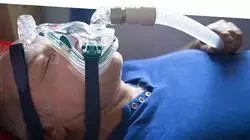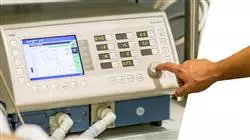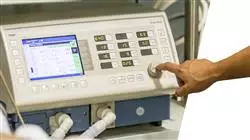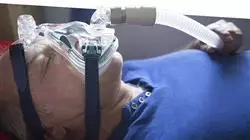University certificate
The world's largest faculty of medicine”
Why study at TECH?
Through this TECHcertificate, you will learn how state-of-the-art software functions to establish patient monitoring in the Intermediate Respiratory Care Unit”

During the most challenging phase of the COVID-19 pandemic, health professionals and specialists in Intermediate Respiratory Care Units played a crucial role in treating complex pulmonary conditions and minimizing the side effects on patients. This circumstance has led to the continuous development of these areas, equipping them with cutting-edge tools to assess and manage these diseases with the utmost rigor, preserving the patients' quality of life. For this reason, pulmonologists working in Intermediate Respiratory Care Units must stay constantly updated to avoid falling behind in the evolution of these units.
Given this situation, TECH has chosen to create this certificate, which offers physicians a cutting-edge understanding of how Intermediate Respiratory Care Units operate. Over 6 months of intensive study, participants will identify the advantages and disadvantages of the new technologies available in Intermediate Respiratory Care Units or delve into the updated pharmacological treatments applied in these areas. Similarly, they will dissect each of the cutting-edge techniques of non-invasive respiratory support and explore modern procedures to address cases of patients who do not respond to Non-Invasive Mechanical Ventilation.
Since this degree is developed through a 100% online methodology, the specialist will have the possibility to make his own study schedules in order to enjoy an effective learning process. Furthermore, this Postgraduate Diploma is taught by experts who have worked in top-level Intermediate Respiratory Care Units and who create the didactic materials for the program. Therefore, the content enjoyed by the students will preserve complete professional applicability.
Study this Postgraduate diploma and be able to analyze the advantages and disadvantages of each of the new technologies adopted in Intermediate Respiratory Care Units (IRCU)”
This Postgraduate diploma in Intermediate Respiratory Care Units (IRCU) contains the most complete and up-to-date scientific program on the market. The most important features include:
- Practical cases presented by experts in Pulmonology
- The graphic, schematic, and practical contents with which they are created, provide scientific and practical information on the disciplines that are essential for professional practice
- Practical exercises where self-assessment can be used to improve learning
- Its special emphasis on innovative methodologies
- Theoretical lessons, questions to the expert, debate forums on controversial topics, and individual reflection assignments
- Content that is accessible from any fixed or portable device with an Internet connection
Identifies updated procedures to address cases of patients who do not respond to Non-Invasive Mechanical Ventilation in LICUs”
The program’s teaching staff includes professionals from the field who contribute their work experience to this educational program, as well as renowned specialists from leading societies and prestigious universities.
The multimedia content, developed with the latest educational technology, will provide the professional with situated and contextual learning, i.e., a simulated environment that will provide immersive education programmed to learn in real situations.
This program is designed around Problem-Based Learning, whereby the professional must try to solve the different professional practice situations that arise during the academic year For this purpose, the students will be assisted by an innovative interactive video system created by renowned and experienced experts.
Study comfortably through formats such as simulation of real cases or explanatory video”

Get updated by specialists who actively work in state-of-the-art Intermediate Respiratory Care Units”
Syllabus
The syllabus of this academic program is made up of 3 modules through which the physician will gain a comprehensive update on the operation of Intermediate Respiratory Care Units. The didactic resources available during this Postgraduate Diploma are offered in a wide range of highly diverse textual and multimedia formats. This way, through a 100% online methodology, you will enjoy a study adapted to your personal and academic needs.

Enjoy a wide variety of textual and multimedia didactic formats and choose the ones that best suit your educational needs”
Module 1. Intermediate Respiratory Care Units (IRCU)
1.1. Fundamentals and Objectives of the IRCUs
1.1.1. Evolution Over Time
1.1.2. Importance and Benefits
1.1.3. Role of IRCUs in Public Health Management
1.2. Features and Organization of IRCUs
1.2.1. Structure and Design
1.2.2. Mechanisms of Coordination and Collaboration Among Various Services
1.2.3. Development of Personalized Care Plans for Each Patient
1.2.4. Assessment and Monitoring of Treatment Outcomes
1.3. Equipment and Technology in IRCUs
1.3.1. Types of Equipment and Technologies Available in IRCUs
1.3.2 Advantages and Disadvantages of Different Available Technologies
1.3.3. New Trends and Advances in Technology Used in IRCUs
1.4. Healthcare Personnel in IRCUs: Functions and Competencies
1.4.1. Professional Profile and Training Requirements for Health Professionals Working in IRCUs
1.4.2. Competencies and Responsibilities of Various Members of Health Personnel
1.4.3. Teamwork and Coordination Among Different Health Professionals in the IRCUs
1.4.4. Continuing Education and Professional Development of Healthcare Personnel in IRCUs
1.5. Indications and Criteria in IRCUs
1.5.1. Criteria for Patient Selection for Admission to IRCUs
1.5.2. Admission Process and Assessment of Patient's Health Status
1.6. Monitoring and Follow-Up of Patients in IRCUs
1.6.1. Capnography
1.6.2. Continuous Pulse Oximetry
1.6.3. Respiratory Software
1.7. Success and Failure Criteria in NIV
1.7.1. Prognosis Scales
1.7.2. Factors Influencing the Success or Failure of NIV
1.7.3. Early Identification of NIV Failures
1.8. Complications and Their Management in NIV
1.8.1. Respiratory Complications
1.8.2. Cardiovascular Complications
1.8.3. Neurological Complications
1.8.4. Gastrointestinal Complications
1.8.5. Dermatological Complications
1.8.6. Psychological Complications
1.9. Pharmacological Treatments in IRCUs
1.9.1. Nutrition and Nutritional Support
1.9.2. Sedation and Analgesia in Patients with NIV
1.9.3. Other Medications in IRCUs
1.10. Discharge Criteria and Patient Follow-Up After Their Stay in IRCUs
1.10.1. Assessment of Patient's Clinical Stability Before IRCU Discharge
1.10.2. Discharge Planning and Patient Follow-Up
1.10.3. Discharge Criteria for NIV
1.10.4. Outpatient Follow-Up After IRCU Discharge
1.10.5. Assessment of Quality of Life After IRCU Stay
Module 2. Non-Invasive Respiratory Support Techniques
2.1. Assessment of the Required Ventilatory Support Level
2.1.1. Assessment of Clinical Indication
2.1.2. Interpretation of Arterial Blood Gas
2.1.3. Assessment of Respiratory Mechanics
2.1.4. Determination of the Required Ventilatory Support Level
2.1.5. Changing Ventilatory Modality
2.2. Continuous Positive Airway Pressure (CPAP)
2.2.1. CPAP principles and mechanics
2.2.2. Indications for the use of CPAP
2.2.3. Adjustment of CPAP parameters
2.2.4. Monitoring and Management of CPAP Complications
2.2.5. Comparison of CPAP with Other Ventilatory Modalities
2.3. Positive Airway Pressure (BiPAP)
2.3.1. Principles and Mechanics of BiPAP
2.3.2. Indications for BiPAP Use
2.3.3. Adjusting BiPAP Parameters
2.3.4. Monitoring and Management of BiPAP Complications
2.3.5. Comparison of BiPAP with Other Ventilatory Modalities
2.4. Pressure Support Ventilation
2.4.1. Conventional (PSV)
2.4.2. Proportional (PPSV)
2.4.3. Adaptive (ASV)
2.4.4. Intelligent Adaptive (iVAPS)
2.5. Volume-Controlled Ventilation
2.5.1. Principles and Mechanics of Volume NIV
2.5.2. Indications for Volume NIV Use
2.5.3. Adjusting Volume Mode Parameters
2.5.4. Monitoring and Management of Complications in Volume Mode
2.5.5. Comparison of Volume Mode with Other Ventilatory Modalities
2.6. High-Flow Nasal Cannula (HFNC)
2.6.1. Principles and Mechanics of HFNC
2.6.2. Indications for HFNC Use
2.6.3. Adjusting HFNC Parameters
2.6.4. Monitoring and Management of HFNC Complications
2.6.5. Comparison of HFNC with Other Ventilatory Modalities
2.7. Combined Ventilation (Positive Pressure (CPAP/BiPAP) + HFNC)
2.7.1. Principles and Mechanics of Combined Therapy
2.7.2. Indications for Combined Therapy Use
2.7.3. Starting Combined Therapy, Simultaneously or Staggered
2.7.4. Adjusting Parameters for Combined Therapy
2.7.5. Monitoring and Management of Complications in Combined Therapy
2.7.6. Comparison of Combined Therapy with Other Ventilatory Modalities
2.8. High-Frequency Ventilation
2.8.1. Indications for High-Frequency NIV Use
2.8.2. Adjusting Parameters
2.8.3. Utility in Acute Patients
2.8.4. Utility in Chronic Patients
2.8.5. Monitoring and Management of Complications
2.8.6. Comparison with Other Ventilatory Modalities
2.9. Others Ventilatory Modes
2.9.1. Pressure Support Ventilation with Mandatory Flow Control (MFC)
2.9.2. High-Velocity Nasal Cannula Ventilation
2.9.3. Other Innovative Ventilatory Modes
2.10. Humidification and Temperature Adjustment in NIV
2.10.1. Importance of Adequate Humidification and Temperature in NIV
2.10.2. Types of Humidification Systems in NIV
2.10.3. Indications for Adding a Humidifier in Acute Patients
2.10.4. Indications for Humidifier Use in Chronic Patients
2.10.5. Methods for Monitoring Humidification in NIV
2.10.6. Temperature Adjustment in NIV
2.10.7. Monitoring and Management of Complications Related to Humidification and Temperature in NIV
Module 3. Beyond Non-Invasive Ventilation in an IRCU Highly Specialized Concepts
3.1. Ventilator Weaning with Tracheostomy in an Intermediate Respiratory Care Unit
3.1.1. Criteria for Performing Tracheostomy in Patients with Prolonged IMV
3.1.2. Patient Preparation for Weaning from IMV
3.1.3. Weaning Techniques from IMV via Tracheostomy
3.1.4. Assessment of Tolerance during Weaning from IMV via Tracheostomy
3.1.5. Management of Complications during Weaning
3.2. Tracheostomy Management in the Intermediate Respiratory Care Unit
3.2.1. Selecting the Appropriate Tracheostomy Technique for the Patient
3.2.2. Initial Tracheostomy Care in the Intermediate Respiratory Care Unit
3.2.3. Tracheostomy Tube Replacement and Maintenance
3.2.4. Monitoring Complications
3.2.5. Assessing the Appropriate Time of Tracheostomy Removal
3.2.6. Decannulation Protocol
3.3. Utilizing Non-Invasive Respiratory Support in the disconnection of orotracheal intubation
3.3.1. Selection of patients who are candidates for disconnection
3.3.2. Techniques for disconnection of orotracheal intubation
3.3.3. Evaluation of tolerance to noninvasive respiratory support during disconnection
3.3.4. Monitoring and management of complications during disconnection
3.3.5. Evaluation of the success of noninvasive respiratory support in the disconnection of orotracheal intubation and patient follow-up
3.4. Secretion Management and Cough Assistance
3.4.1. Indications
3.4.2. How to measure it
3.4.3. Different devices
3.4.4. Pressure configuration
3.4.5. How to use it
3.5. NIV and polygraphy, indications and interpretation
3.5.1. Indications for polygraphy in the NIV patient
3.5.2. Interpretation of polygraphy results in patients with NIV
3.5.3. Identification of abnormal respiratory patterns on polygraph during the use of NIV
3.5.4. Monitoring the efficacy of respiratory support during polygraphy
3.5.5. Interpretation of respiratory complications associated with NIV on polygraphy
3.6. Physiotherapy in an IRCU
3.6.1. Objectives and benefits of respiratory physiotherapy in the IRCU
3.6.2. Respiratory physiotherapy techniques used in the IRCU
3.6.3. Physiotherapy in the prevention and treatment of respiratory complications in the IRCU
3.6.4. Assessment and follow-up of patient progress with respiratory physiotherapy in the IRCU
3.6.5. Multidisciplinary collaboration in the implementation of respiratory physiotherapy in the IRCU
3.7. Management of shock and other frequently used drugs in IRCU
3.7.1. Types of shock and its management in the IRCU
3.7.2. Indications and dosage of vasopressors in the management of shock in the IRCU
3.7.3. Use of inotropics and vasodilators in the management of shock in the IRCU
3.7.4. Management of hypotension in the IRCU with fluid therapy
3.7.5. Monitoring hemodynamic and patient response to drugs used in the management of shock in IRCU
3.8. Swallowing Disorders Evaluation
3.8.1. Prolonged Orotracheal Intubation
3.8.2. Tracheostomy
3.8.3. Ineffective Swallowing
3.9. Nutritional study in patients with prolonged admission to the IRCU
3.9.1. Nutritional and metabolic assessment in patients in the IRCU
3.9.2. Evaluating Nutritional Status and Energy Needs
3.9.3. Nutritional strategies for patients with prolonged admission to the IRCU
3.9.4. Monitoring of nutritional support and necessary adjustments in IRCU patients
3.9.5. Prevention and management of nutritional complications in patients with prolonged admission to the IRCU
3.10. Management of Unstable Patients
3.10.1. Management of Rapid Atrial Fibrillation
3.10.2. Management of Supraventricular Tachycardia
3.10.3. Management of Cardiopulmonary Arrest
3.10.4. Orotracheal Intubation
3.10.5. Sedation in NIV

Enroll in this Postgraduate Diploma and update your knowledge without the need to make uncomfortable daily commutes to a study center”
Postgraduate Diploma in Intermediate Respiratory Care Units (IRCU)
In the Postgraduate Diploma in Intermediate Respiratory Care Units (IRCU), you will immerse yourself in the study of the latest techniques and practices related to respiratory care. You will learn how to operate and monitor advanced medical equipment and devices, interpret diagnostic tests, and implement effective treatment strategies to improve patients' quality of life. Upon completion of the Postgraduate Diploma in Intermediate Respiratory Care Units (IRCU), you will receive a nationally and internationally recognized certificate from TECH Global University. This will support your knowledge and skills, giving you a competitive edge in the job market and opening up new career opportunities in the field of respiratory health.
Enroll now and advance in your professional path
TECH Global University presents the Postgraduate Diploma in Intermediate Respiratory Care Units (IRCU), a unique opportunity to specialize in a field of vital importance in the field of health. In this online modality, you will be able to acquire the knowledge and skills necessary to provide specialized care to patients with respiratory diseases, without having to interrupt your professional career. The online modality of this program gives you the flexibility to study from anywhere and adapt your study schedule to your personal and work needs. TECH Global University understands the demands of your daily life and gives you the opportunity to access a quality education without having to physically move to a campus. One of the advantages of this online program is the possibility of interacting with a teaching team of excellence, made up of professionals with extensive experience in the field of respiratory health. In addition, you will have access to digital resources, study material and interactive learning tools that will enrich your academic experience. Don't miss the opportunity to advance your career and make a difference in the care of patients with respiratory diseases. Enroll today in the Postgraduate Diploma in Intermediate Respiratory Care Units (IRCU) from TECH Global University of Technology and become an expert in respiratory care excellence.







